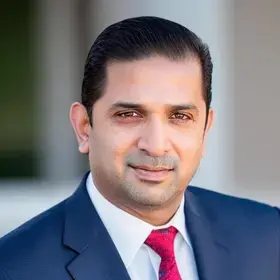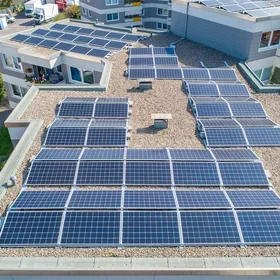By Iza Martinez
The M.S. in Sustainability Management program (SUMA) boasts an impressive faculty of sustainability and business leaders. Among them is Angela Jhanji, whose career is marked by a series of substantial accomplishments. Currently leading Sustainability Integration for EQT’s Private Capital division, she draws from her experience as a key member of Grant Thornton’s ESG Leadership team, where she played a pivotal role in establishing and expanding ESG integration advisory. Prior to this, Angela spent nearly a decade shaping sustainability strategies at Accenture Strategy, collaborating with clients across numerous industries.
Angela’s new class, Sustainability Value Creation in Private Markets, equips SUMA students with the practical skills to integrate sustainability throughout the investment lifecycle. In this interview, she provides additional context for sustainability value creation and evolving private market demands and gives her insights into the future directions of this rapidly changing landscape. This guidance is invaluable for aspiring leaders wanting to make a tangible impact in sustainable finance.
Why is Sustainability Value Creation such an important and emerging topic in the private markets?
The direction of travel in global private markets is such that the right skills and expertise are severely lacking in sustainability matters in private markets. Despite the explosion of commentators and external vendors dipping their toes into this fountain of hope for a more sustainable future, very few understand private markets, not least because private markets continue to evolve in terms of asset classes, investment strategies, and even key players who all bring their own approach.
With this evolution, there is a need to create future leaders and professionals who can respond to the emergence of this topic as business as usual, who can quantify and talk about sustainability from a financial perspective, getting clear and concise about capex, opex, and thereby EBITDA impact.
The four main trends driving the focus on sustainability value creation in private markets today are:
Greater sophistication and expectations from Limited Partners (LPs): LPs such as CalPERS and APG are starting to push General Partners (GPs) to get clear around the interventions in sustainability they are applying throughout the lifecycle of an investment and focus on topics that are material to enterprise value. LPs themselves are also being driven by regulation (especially in Europe) and their own stakeholder demands, including from governments and the public, whose pensions they manage.
Regulatory changes and their impact: Regulatory measures, like the Sustainability Finance Disclosure Regulation (SFDR), have pushed GPs to improve the integration of sustainability considerations into the investment lifecycle and regularly report on their progress. Many leading funds now include a sustainability-focused full potential plan during their ownership period, increasing the scope of sustainability in the investment lifecycle from due diligence through to the hold period and towards an exit story using measurable KPIs to monitor progress on material sustainability outcomes.
GP Maturity: For the past 3-4 years, many GPs have quickly hired sustainability experts and leveraged external vendors to bolster their sustainability commitments and increase internal skills and capacity on this topic. The number of ESG-specific Partner roles at GPs is increasing annually as firms recognize the topic as a senior management issue. Today, sustainability teams are growing faster than investment teams at some firms, with their focus shifting from setting targets to execution and proactive management of investments from entry to exit. From AI-enabled sustainability interventions to bespoke sub-sector playbooks, the bar is consistently being raised from all directions.
Competition: Because of the developments above, LPs and GPs are moving with the market as it evolves. Leaders emerge, and there is an incremental push forward as even the middle of the pack progresses.
What changes do you hope to see in the field of sustainability in the future?
I hope that, as we move from setting targets and large proclamations, governments, businesses, and civil society can talk about executing their transition plans. I see sustainability moving away from compliance and sitting in the center of the growth conversation, championed by strong leadership teams and reputable GPs.
As the market develops, more data will become available linking sustainability outcomes with the balance sheet and showing clear evidence of how sustainability can drive enhanced returns and more resilient businesses. As this data becomes more available, sustainability outcomes will be incorporated into business-as-usual decision-making, which will help drive more sustainable private (and public) markets globally.
What advice do you have for students pursuing a career in sustainability?
Everything is changing always, and now is the time to learn. Standards, regulations, and sophistication grow by the minute, and you (more than me) have the time to indulge in the details and share a very informed perspective. Be hungry for knowledge—it is being created as we speak.
Empower yourself with a problem-solving toolkit and structured communication. With the amount under the umbrella today in the world of sustainability, these two things will help you navigate and help the world around you get it right.
If you can spot a trend coming up, share your point of view. Sustainability has never been a more exciting nor execution-oriented market. You are lucky to be living through a time when you get to graduate into this market. Explore, connect, and bring your knowledge to every interaction you have.
Some people will tell you that success is about hard work; others will say it’s luck or being in the right place at the right time. It’s both—and given that we are at a unique point in history where sustainability is rising to the top of the business agenda, you only have to work hard to be successful in this space!
Read more about Angela Jhanji and her new course, Sustainability Value Creation.
About the Program
The Master of Science in Sustainability Management program, offered by the School of Professional Studies in partnership with the Climate School, is designed for current and aspiring leaders who wish to pursue a career in management at the intersection of business and the environment.


